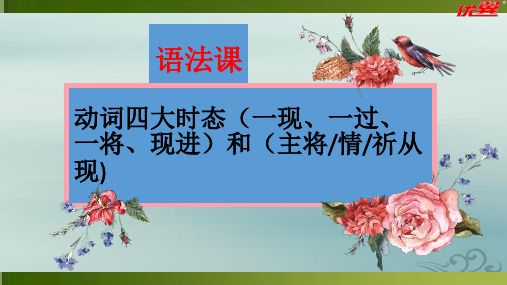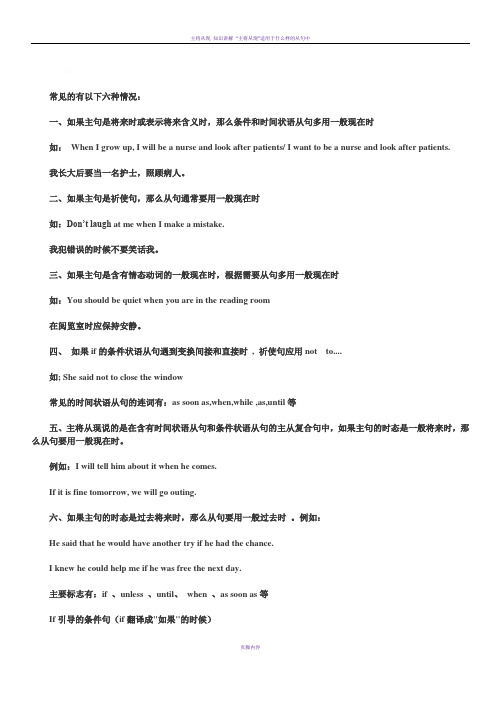主将从现的用法和公式
主将从现

• 时间状语从句 when\ whenever\ once\ as soon as\ unless\ before\ after • As soon as he comes, I will leave. • Unless he comes, I won’t go. • Once I get the job, I will do it well. • Unless he comes, I won’t go. • Before he comes back, I will leave. • After I graduate from the university, I will go to Beijing.
主将从现是指在时间状语从句和条件状语从句 中,如果主句是一般将来时,从句用一般现在时 替代一般将来时。
• 常见的有以下几种情况: 一、时间状语从句的主句是一般将来时,那么从 句常常用一般现在时 如: When I grow up, I’ll be a nurse and look after patients 我长大后要当一名护士,照顾病人 二、如果主句是祈使句,那么从句通常要用一般 现在时 如:Don’t laugh at me when I make a mistake. 我犯错误的时候不要笑话ቤተ መጻሕፍቲ ባይዱ。 三、如果主句是含有情态动词的一般现在时,根 据需要从句多用现在进行时 如:You should be quiet when you are in the reading room 在阅览室时应保持安静 四.含有if的条件状语从句。If it rains tomorrow, we won’t go.
主将从现时间让步状语从句

主将从现时间让步状语从句
主将从现时间让步状语从句是一个复合句结构,在主句中,主语是主将,谓语是从现时间让步状语从句。
从现时间让步状语从句表示主将从现在的时间点开始,进行了某种动作或状态,虽然有一定的困难或限制,但还是按照计划或决定进行。
以下是符合题目要求的10个例子:
1. 虽然天气很冷,主将还是坚持每天早起晨跑。
2. 尽管时间紧迫,主将还是努力完成了任务。
3. 虽然路途遥远,主将仍然决定徒步穿越整个国家。
4. 尽管经济困难,主将依然坚持捐款帮助需要的人。
5. 虽然工作繁忙,主将还是抽出时间陪伴家人。
6. 尽管面临困难和挑战,主将不放弃追求自己的梦想。
7. 虽然身体疲惫,主将仍然坚持参加每周一次的羽毛球训练。
8. 尽管遭遇失败,主将没有失去信心,继续努力实现目标。
9. 虽然面临巨大的压力,主将仍然保持冷静,并做出了正确的决策。
10. 尽管遭遇了一系列的挫折,主将依然不放弃追求幸福和成功的努力。
以上例子展示了主将从现时间让步状语从句的用法,通过从句表达了主将在面临困难或限制的情况下仍然坚持或决定做某事的态度和行动。
这些例子中的主将可以是一个人,也可以是一个团体或组织。
通过这种句式的使用,可以强调主将的坚定意志和决心,展示他们
克服困难的能力和毅力。
人教八年级下语法课:动词四大时态(一现、一过、一将、现进)和主将、情、祈从现 (35张ppt)

(2)表示过去的习惯或过去经常发生的动作。如: When I was in the countryside,I often swam in the river. 我在乡下时,常常在河里游泳。
即学即练
1.Tom _s_w_e_p_t__ (sweep) the floor yesterday. 2.He _t_o_o_k___(take ) some medicine this morning . 3.My family _w__e_n_t__ (go) to Beijing last year. 4.I _c_o_u_l_d_ (can ) ride a bike when I was 6 years old.
(2)表示客观事实或普遍真理。如: The earth goes around the sun.地球绕着太阳转。
表格更直观,快速复制到大脑中
时态 用法
谓语构成
常用的时间状语
一般 现在 时态
1. 表示现在 经常性、反 复性的状态 或动作 2. 客观事实 和真理
1. be 动 词 作 谓 语 用 am /is/are+表语 2. 实 义 动 词 作谓语用动
( C )4.Frank ______ to see his grandma if he ______
(2)表示现阶段正在进行的动作或存在的状态。如: They are studying hard this term. 他们这个学期学习一直很努力。
(3)come,go,leave,arrive,start等动词用现在进行时表示将来。 如:The bus is coming soon.车不久就会来了。
一般现在时表将来的用法

一般现在时表将来的用法一般现在时表将来怎么用呢,英语语法网带你一起来学习!一、“主将从现”原则,当主句为将来时态或表示将来意义时,时间和条件的状语从句必须用一般现在时表将来:i'llwritetoherwhenihavetime.我有空会给她写信。
turnoffthelightsbeforeyouleave.走前关灯。
ifwehurry,wemaycatch thebus.如果赶紧走我们可能赶得上公共汽车。
tellmeinca seyougetintodiffic ulty.遇到困难请告诉我。
①除表示时间和条件的状语从句外,表示让步、相似、比例的从句也必须用一般现在时表将来:i'llfollowhi mwhereverhegoes.他去哪儿,我就跟着去哪。
whatever yousay,iwon'tpay.无论你说什么,我都不会付钱。
whe therwehelphimornot,hewillfail.无论我们帮他与否,他都会失败。
i'llhav eagoodtimewhetheri winorlose.赢也好,输也好,我都将会玩好。
themoreyoue at,thefatteryouwil lbecome.②另外,当主句为用将来时态时,定语从句也通常用一般现在时表将来:i'llgiveyoua nythingyouaskfor.你要什么我都给你。
youcanhave anythingifind.我找到的任何东西你都可以拿去。
everyon ewhocomesfirstwill getapresent.每个先来的人都可得到一份礼物。
二、简化原则按照英语习惯,一个句子中若主要动词已经表明了所谈论动作的时间,那么与之相关的其他动词就不必再次指明同一时间,而往往使用一个比较简单的时态,如用一般现在时表示一般将来时等。
比较:t hisdiscoverymeanst hatwewillspendless onfood.这一发现意味着我们将减少在食品上的花费。
主将从现常见的有以下六种情况

常见的有以下六种情况:一、如果主句是将来时或表示将来含义时,那么条件和时间状语从句多用一般现在时如:When I grow up, I will be a nurse and look after patients/ I want to be a nurse and look after patients.我长大后要当一名护士,照顾病人。
二、如果主句是祈使句,那么从句通常要用一般现在时如:Don’t laugh at me when I make a mistake.我犯错误的时候不要笑话我。
三、如果主句是含有情态动词的一般现在时,根据需要从句多用一般现在时如:You should be quiet when you are in the reading room在阅览室时应保持安静。
四、如果if的条件状语从句遇到变换间接和直接时, 祈使句应用not to....如; She said not to close the window常见的时间状语从句的连词有:as soon as,when,while ,as,until等五、主将从现说的是在含有时间状语从句和条件状语从句的主从复合句中,如果主句的时态是一般将来时,那么从句要用一般现在时。
例如:I will tell him about it when he comes.If it is fine tomorrow, we will go outing.六、如果主句的时态是过去将来时,那么从句要用一般过去时。
例如:He said that he would have another try if he had the chance.I knew he could help me if he was free the next day.主要标志有:if 、unless 、until、when 、as soon as等If引导的条件句(if翻译成"如果"的时候)Ⅰ.(if 从句) 主句v./ v.三单will+v.Ⅱ. if+sb+v./ v.三单can+v.某事很可能发生,条件是可能存在的,主句中某种情况发生的概率也是很高的。
主将从现知识讲解

主将从现知识讲解“主将从现”适用于什么样的从句中学员:王韧聪教师:李军力if引导条件状语从句的两种用法:“主将从现”和表事实时用现在时零碎用法" if " 引导的条件状语从句的用法,现在总结一下:if 条件句不一般,几个要点记心间;条件句,放在前,逗号要放句中间。
条件句表可能,主句多用将来时;条件句表事实,主句常用现在时。
在 if 引导的条件状语从句中,如果从句谈论的是一个有可能发生的事实及其产生的相关的结果,主句用一般将来时态,从句用一般现在时态。
如:We can walk there if we can't find a bus .If it rains tomorrow , we will not go to the zoo.What will you do if you find a panda in danger.如果 if 条件句谈论的是重复发生和预示要发生的情景和事件,则主从句大多用一般现在时态。
如:If bears are in danger ,they attack people.注意:在 if 引导的条件状语从句中,if 条件句位置灵活,可直接放在主句后面,若 if 条件句放句首,从句后面要加逗号,和主句隔开。
还要注意前后时态一致原则我们知道,引导条件状语从句最常用的连词是if,由if引导的条件状语从句表示在某种条件下某事很可能发生。
如:If you ask him, he will help you.如果你请他帮忙,他会帮你的。
If you fail in the exam, you will let him down.如果你考试不及格,你会让他失望的。
另外,if从句还表示不可实现的条件或根本不可能存在的条件,也就是一种虚拟的条件或假设,从句多用一般过去时或过去完成时。
如:If I were you, I would invite him to the party.如果我是你,我会邀请他参加聚会。
主将从现常见的有以下六种情况
常见的有以下六种情况:一、如果主句是将来时或表示将来含义时,那么条件和时间状语从句多用一般现在时如:When I grow up, I will be a nurse and look after patients/ I want to be a nurse and look after patients.我长大后要当一名护士,照顾病人。
二、如果主句是祈使句,那么从句通常要用一般现在时如:Don’t laugh at me when I make a mistake.我犯错误的时候不要笑话我。
三、如果主句是含有情态动词的一般现在时,根据需要从句多用一般现在时如:You should be quiet when you are in the reading room在阅览室时应保持安静。
四、如果if的条件状语从句遇到变换间接和直接时, 祈使句应用not to....如; She said not to close the window常见的时间状语从句的连词有:as soon as,when,while ,as,until等五、主将从现说的是在含有时间状语从句和条件状语从句的主从复合句中,如果主句的时态是一般将来时,那么从句要用一般现在时。
例如:I will tell him about it when he comes.If it is fine tomorrow, we will go outing.六、如果主句的时态是过去将来时,那么从句要用一般过去时。
例如:He said that he would have another try if he had the chance.I knew he could help me if he was free the next day.主要标志有:if 、unless 、until、when 、as soon as等If引导的条件句(if翻译成"如果"的时候)Ⅰ.(if 从句) 主句v./ v.三单will+v.Ⅱ. if+sb+v./ v.三单can+v.某事很可能发生,条件是可能存在的,主句中某种情况发生的概率也是很高的。
八年级英语语法主将从现知识点精讲及专项练习
八年级英语语法主将从现知识点精讲及专项练习主将从现定义:主将从现是指在时间状语从句和条件状语从句中,如果主句是一般将来时,从句用一般现在时替代一般将来时。
引导时间状语的引导词when , while , before , after , untill , till , since , as soon as主将从现一般出现的四种情况:一、如果主句是将来时或表示将来含义时,那么条件和时间状语从句多用一般现在时如:When I grow up, I will be a nurse and look after patients/ I want to be a nurse and look after patients.我长大后要当一名护士,照顾病人。
二、如果主句是祈使句,那么从句通常要用一般现在时如:Don’t laugh at me when I make a mistake.我犯错误的时候不要笑话我。
三、如果主句是含有情态动词的一般现在时,根据需要从句多用一般现在时如:You should be quiet when you are in the reading room在阅览室时应保持安静。
when引导的时间状语从句例句展示:As soon as I reach Canada, I will ring you up. 我一到加拿大,就给你来电话。
I’ll call you as soon as I get home.我一到家就给你打电话。
I’ll wait here until/till the rain stops.我将在这里等着,直到雨停。
You can’t go home until/till you finish your work.直到你完成你的工作,你才能回家。
I will tell you after they leave. 等他们走后我再告诉你。
We must strike while the iron is hot. 我们必须趁热打铁。
最新一般将来时-be-going-to-be-to-do-主将从现课件PPT
3. be to do 将要发生的事;必然要发生的事; 打算 The book I edited is to publish soon.
1.My son has a pain in his stomach and is g_o_i_n_g_t_o_ have an X-ray. 2.It’s ten o’clock and I’ve got a
headache. I think I _w__il_l_ take an aspirin.
2. be going to do
1) 用来表示主观上打算在将来某个时 候做某事。 We’re going to pick apples next Wednesday.
Hale Waihona Puke 2)用来表示即将发生的事 The twins are going to meet Kate at the station at 7:00.
3. I’ve thought about it a lot and I __a_m__g_o_i_n_g_t_o___ start diet tomorrow. I want to lose weight.
4. My daughter has decided to study medicine. She __is_g_o_i_n_g__to___ be a doctor.
– Let’s go out to play football, shall we?
主将从现
主将从现情况小结主将从现问题是中考考点之一。
它是指在时间状语从句和条件状语从句中,如果主句是一般将来时,从句用一般现在时替代一般将来时。
常见的有以下三种情况:一、条件状语从句、时间状语从句的主句是一般将来时,那么从句常常用一般现在时。
如:When I grow up, I’ll be a nurse and look after patients.我长大后要当一名护士,照顾病人。
If tomorrow is rainy,we won't go.二、如果主句是祈使句,那么从句通常要用一般现在时。
如:Don’t laugh at me when I make a mistake.我犯错误的时候不要笑话我。
三、如果主句是含有情态动词的一般现在时,根据需要从句多用一般现在时。
如:You should be quiet when you are in the reading room.在阅览室时应保持安静。
四、as soon asAs soon as she gets here, I’ll tell her about it.五.UnlessI will not go there unless I am free that day.六、untilI won’t go out until the rain stops.练习单项选择(中考题):1 If he ___ harder , he will catch up with us soon.(04 北京)A studyB studiesC will studyD studied2 I will go swimming with you if I ___ free tomorrow.(04哈尔滨)A will beB shall beC amD was3 If you ___ a chance to study in a foreign country ,just take it .(04 苏州)A gettingB had gotC will getD get4 Don’t leave until he ___ back.()A have comeB comesC will comeD came5 “Shall we have the volleyball match tomorrow?”“ Oh, it will be put off if it ____.(04 黄冈)A snowsB is snowingC snowedD will snow6 -Tell him about the news when he ____ ,John. -Yes, I will.(04 宁波)A comesB will comeC wouldD is coming7 Tomorrow we will go to the city park____ it is sunny.(05 安徽)A as soon asB whenC ifD as8 Please don’t leave until your teacher ___back.(05河南)A will comeB cameC comesD is coming9 I want to know if there ___a sports meeting next month . If they ___ it , I must get ready for it。
- 1、下载文档前请自行甄别文档内容的完整性,平台不提供额外的编辑、内容补充、找答案等附加服务。
- 2、"仅部分预览"的文档,不可在线预览部分如存在完整性等问题,可反馈申请退款(可完整预览的文档不适用该条件!)。
- 3、如文档侵犯您的权益,请联系客服反馈,我们会尽快为您处理(人工客服工作时间:9:00-18:30)。
主将从现的用法和公式
▲主从复合句中时态的一致主要有以下几种情况:
【主将从现】
在以when,after,as soon as等引导的时间状语从句以及以
if,unless等引导的条件状语从句中,如果主句是一般将来时,从句则用一般现在时。
I'll tell her the good news when she comes back.
当她回来的时候,
我将把这个好消息告诉她。
If it doesn't rain, he will come here on time.
如果不下雨,他会按时来这儿的。
※如果主句是祈使句,那么从句通常要用一般现在时。
如:
Don’t laugh at me when I makea mistake.
我犯错误的时候不要笑话我。
※如果主句是含有情态动词的一般现在时,根据需要从句多用一般现在时。
如:
You should be quiet when you are in the reading room.
在阅览室时应保持安静。
【主过从过】
在含有宾语从句的主从复合句中,当主句的谓语动词为过去时态时,从句须用表示过去的某种时态。
例如:
He asked when they would go to the party.
他问他们什么时候将去参加聚会。
Miss Green said she had been to Beijing before.
格林小姐说她以前曾经去过北京。
【主现从任】
在宾语从句中,当主句的时态为一般现在时、现在进行时、现在完成时等时态时,后面从句时态不受主句限制,可根据情况,选用各种适合的时态。
例如:
Do you know when we'll have a football match?
你知道我们什么时候举行足球赛吗?
You know he has gone to Shanghai.
你知道他已去上海了。
▲“时态后移”(tense back—shift)”,指的是复合句中的主句动词为过去时或过去完成时时,其从句动词如为陈述语气,则时态应作相应的后移,以便与主句动词在时间上取得逻辑上的呼应,即从句动词现在时应后移为过去时;过去时应后移为过去完成时。
The staff members were askedto arrive a few minutes earlier before the meeting started.
(这里before从句可用完成时态吗?)
▲before从句的过去完成时都是属于虚拟语气,表示从句事件都没有实现。
The bell rang beforewe had finished our work.
I met George before hehad heard the news.
Tom called to see mebefore l had had breakfast.
The thief was caughtbefore he had disposed of t11e sto1en
goods.
在语义上,这四句分别等价于:
When the bell rang,we had not finished our work.
When l met George,he had not heard the news.
When Tom called to seeme ,Ihad not had breakfast.
When the thief wascaught,he had not disposed of the stolengoods.。
